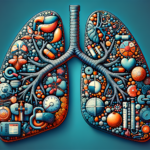Understanding COPD and Its Impact
Chronic Obstructive Pulmonary Disease (COPD) is a long-term lung condition characterized by breathing difficulties due to airflow obstruction. It primarily includes emphysema and chronic bronchitis. COPD is a progressive disease, meaning it worsens over time, and is a significant cause of disability and death worldwide. Understanding the nature of COPD is crucial for managing its symptoms effectively and improving the quality of life for those affected.
The primary risk factor for COPD is smoking, although exposure to air pollutants, genetic factors, and respiratory infections also contribute. Symptoms include chronic cough, mucus production, and shortness of breath, which can severely impact daily activities and reduce life expectancy. Early diagnosis and management are vital, as they can slow disease progression and alleviate symptoms.
Effective COPD management involves a combination of medical treatments and lifestyle changes. By following a comprehensive treatment plan, individuals can potentially improve their lung function and overall well-being. This article delves into various treatment options, including inhaler guidelines and lifestyle adjustments, to help those with COPD breathe easier every day.
Pharmacological Treatments for COPD
Pharmacological treatments play a significant role in managing COPD symptoms and improving lung function. These treatments aim to reduce inflammation, relax airway muscles, and prevent exacerbations. The primary medications used include bronchodilators, corticosteroids, and combination inhalers.
Bronchodilators are a cornerstone of COPD management. They work by relaxing the muscles around the airways, making breathing easier. These can be short-acting for immediate relief or long-acting for ongoing control. Corticosteroids, on the other hand, help reduce inflammation in the airways, although they are typically used in combination with bronchodilators for those with more severe symptoms.
Combination inhalers, which include both bronchodilators and corticosteroids, offer a convenient and effective option for many patients. They provide comprehensive symptom control and are often recommended for individuals with frequent exacerbations. It is essential to follow inhaler guidelines to ensure maximum benefit from these medications. Proper inhaler technique can significantly impact the effectiveness of the treatment, so patients should regularly consult with healthcare providers to refine their technique.
Non-Pharmacological Treatments and Lifestyle Changes
In addition to medications, non-pharmacological treatments and lifestyle changes are crucial components of COPD management. These approaches focus on improving overall health, enhancing lung function, and reducing the risk of exacerbations.
Smoking cessation is the most critical lifestyle change for individuals with COPD. Quitting smoking can slow disease progression and improve lung health. Support from healthcare providers, counseling, and nicotine replacement therapies can increase the chances of successfully quitting.
Regular physical activity is also beneficial for COPD patients. Exercise can improve cardiovascular fitness, muscle strength, and overall endurance. Pulmonary rehabilitation programs, which combine exercise training, education, and support, are highly effective in improving quality of life for those with COPD.
Dietary changes can also support lung health. A balanced diet rich in fruits, vegetables, and lean proteins provides essential nutrients and antioxidants that can help combat inflammation. Staying hydrated is equally important, as it helps thin mucus, making it easier to clear from the lungs.
Managing Exacerbations and Complications
Exacerbations, or flare-ups, are periods when COPD symptoms worsen significantly. These can lead to hospitalization and further lung damage, making it essential to manage them effectively. Early recognition and intervention are key to minimizing their impact.
To manage exacerbations, patients should have an action plan developed with their healthcare provider. This plan typically includes recognizing early signs of a flare-up, such as increased breathlessness or changes in mucus production, and adjusting medications accordingly. Quick-acting bronchodilators are often used to relieve symptoms during these periods.
Preventing exacerbations is equally important. Regular vaccinations, such as the flu and pneumonia vaccines, can help reduce the risk of respiratory infections that may trigger flare-ups. Additionally, avoiding exposure to air pollutants and allergens can help maintain stable lung function.
Complications of COPD, such as respiratory infections and heart problems, require careful monitoring and management. Regular check-ups with healthcare providers can help detect and address these issues early, preventing further deterioration of health.
Innovative Therapies and Future Directions
Research into COPD treatments is ongoing, with new therapies and approaches continually being explored. Innovative treatments aim to address the underlying causes of COPD and provide more effective symptom management.
One promising area of research is the development of biologic therapies. These medications target specific pathways involved in inflammation and immune response, offering potential benefits for those with severe COPD. Although still in early stages, biologics represent a significant advancement in personalized COPD treatment.
Stem cell therapy is another area of interest. This approach involves using stem cells to repair damaged lung tissue, potentially reversing some of the damage caused by COPD. While research is still in progress, early results are promising and may pave the way for new treatment options in the future.
As our understanding of COPD evolves, so too do the treatment options available. Continued research and innovation hold the potential to improve outcomes for individuals with COPD, offering hope for a better quality of life and more effective management of this challenging condition.








